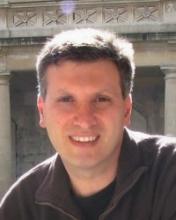A Note From our Acting Chair: Anis Bawarshi
Greetings from the English Department, where the past six months have been a time of transition, reflection, and planning ahead.
After serving as chair of the English department for four years, Brian Reed accepted the position of UW Divisional Dean of the Humanities last July. We are grateful to Brian for taking on this larger role as advocate for the humanities at such a critical time, and we are indebted to him for his wisdom, patience, and vision in leading the department in the face of many political and financial challenges. Stepping in as acting department chair for the year is a humbling experience for me, not just in terms of the responsibility involved but also in terms of the perspective it gives on the hard, impactful work of our faculty, staff, and students who enact our mission every day. I am grateful to Maya Sonenberg, who generously stepped in as Associate Chair for the year, as well as to our program directors and staff for making sure our department runs smoothly. I am pleased to welcome David Crouse as the new Creative Writing Program Director and Colette Moore as our new department scheduler, replacing Mark Patterson, who served skillfully in that role for years. I am also pleased to welcome Ali Dahmer as the new Graduate Program Manager.
Much of the last year has been spent preparing for our department’s ten-year review, the occasion of which has given us opportunities to reflect on the value of our work in its various forms. We live in a time that especially calls for what literature, the making of texts, and the study of language use can teach us, not just about art and the imagination but also about what it means to engage with complex ideas that challenge our ways of knowing, invite us to examine the sources of our ideas, and stretch us to inhabit other perspectives. Our work in developing critical and creative thinking, strengthening analytical reading and writing skills, and supporting communication across difference offer unique contributions to problem solving and responding to complex, urgent public issues.
In preparing for the ten-year review, it has been inspiring to document the many ways our faculty, staff, and students carry out our core teaching, research, and service mission, including the multiple community-oriented teaching and training programs we offer. It was startling to learn that over the last ten years, for example, undergraduate students provided very close to 75,000 hours of community service with local organizations and as tutors in area schools through English department service-learning courses and the Community Literacy Program, led by Elizabeth Simmons-O’Neill.
As we look back and ahead, I would like to extend a special congratulations to Pimone Triplett and Alys Weinbaum for their promotions to the rank of Full Professor (for more details, see Faculty and Staff Notes section), and to Frances McCue for being awarded a UW Distinguished Teaching Award. I would also like to thank our recently retired colleagues Carolyn Allen, Kate Cummings, Mona Modiano, and Leroy Searle for their countless and lasting contributions to our department, and to Kathy Mork, who retired after years of service to our graduate program. We profiled Carolyn, Leroy, and Kathy in last spring’s issue of English Matters. In this issue we profile Kate and Mona (see Faculty and Staff Notes). You will also find here in English Matters news about our faculty, current students, and alumni—their successes, awards, and accomplishments—as well as a profile about the Scheingold Lecture series on poetry and poetics, made possible by Lee Scheingold’s generous support. We are grateful for the support of our donors, who help give our work wider reach.
While we celebrate these milestones, there are also reasons to be melancholy as 2018 nears an end. Two of our emeriti have passed away, professors who devoted decades of their lives to serving the department and the university. You will find in this issue Míċeál Vaughan’s remembrance of Robert Stevick and Robert Abrams’ remembrance of Robert Stanton. We honor their memory as we continue to practice what we do in English, and the humanities at large, in ways that engage the diversity of individuals, knowledge, objects, and forms of inquiry that is crucial to this work.
